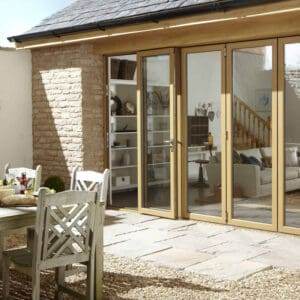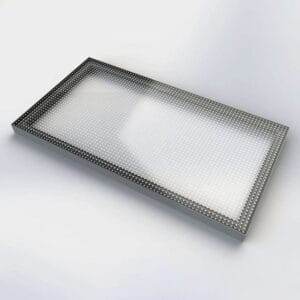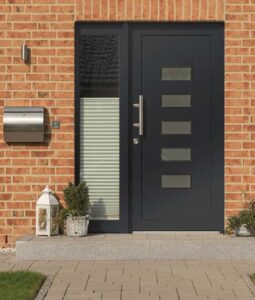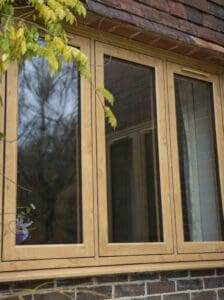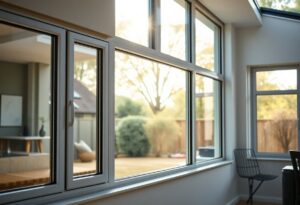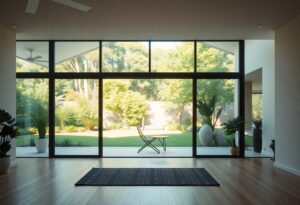Moisture control is crucial for ensuring a healthy indoor environment in your home. uPVC French doors not only enhance your property’s aesthetic appeal but also play a significant role in reducing condensation and moisture build-up. By providing excellent thermal insulation and a tight seal, these doors help keep your living space comfortable and prevent the growth of mould and mildew, which can harm your health. For more tips on Preventing Condensation Issues in PVC Windows, you can explore expert advice to further enhance your indoor air quality.
The Science of Condensation
A deep understanding of condensation is important in maintaining a healthy indoor environment. It occurs when warm, moist air cools and loses its capacity to hold water vapour, resulting in tiny water droplets forming on surfaces. How to prevent and deal with condensation in double glazing can help you address this common issue effectively.
Understanding Humidity Levels
Science indicates that humidity levels within your home play a significant role in condensation formation. Ideally, indoor humidity should be maintained between 30% and 50%. Surpassing these levels can lead to excess moisture, which exacerbates condensation problems.
Causes of Condensation in Homes
Across various environments, condensation can occur due to several factors, including inadequate ventilation, high humidity levels, and temperature fluctuations. Recognising these challenges enables you to take proactive steps to mitigate condensation.
Condensation often results from excess moisture generated by daily activities such as cooking, showering, and even breathing. It can lead to mould growth and can damage your property if left unaddressed. Factors such as poor insulation and drafty windows further exacerbate the issue, causing cold surface temperatures that accelerate moisture accumulation. By implementing effective moisture control strategies, you can maintain a healthier indoor environment and protect your home.
The Role of uPVC in Moisture Control
Clearly, uPVC plays a significant role in managing moisture levels within your home. Its robust structure and thermal efficiency help prevent condensation, which can lead to serious health issues and damage. By incorporating uPVC French doors, you not only enhance your home’s aesthetics but also contribute to an environment less prone to dampness. For more insight, learn How Double Glazing Can Improve Indoor Air Quality.
Properties of uPVC Material
On the whole, uPVC is a non-porous material that does not absorb moisture, making it an excellent barrier against water infiltration. Its insulating properties keep your indoor environment stable, reducing the likelihood of temperature fluctuations that can generate condensation and damp issues.
How uPVC Affects Indoor Humidity
An effective uPVC installation can greatly influence indoor humidity levels. Properly fitted uPVC French doors can create an airtight seal, reducing drafts and moisture ingress that typically raise humidity levels.
With uPVC’s ability to maintain a consistent temperature, you can eliminate hot and cold spots that often contribute to excessive humidity. By controlling these levels, you will significantly reduce the risk of mould growth and related health issues. A well-sealed environment promotes overall comfort and creates a safer living space, protecting both your health and your property from the effects of moisture build-up.
Design Features of uPVC French Doors
If you are considering uPVC French doors for your home, you will appreciate their elegant and versatile design features. These doors not only enhance the aesthetic appeal of your property but also offer practical benefits such as ease of use and efficient space management. Their large glass panels allow natural light to flood your interiors while providing an unobstructed view of your garden or outdoor area, bringing the outside in. You will find that these doors can effortlessly complement any contemporary or traditional home design.
Weather-Resistant Seals
Besides their attractive appearance, uPVC French doors are equipped with advanced weather-resistant seals. These seals prevent moisture and draughts from seeping into your home, ensuring a more stable indoor environment. This feature helps in reducing the likelihood of condensation, which in turn can lead to potential health issues such as mould growth. By ensuring your doors are snug and secure, you will enjoy a comfortable living space regardless of the weather outside.
Thermal Insulation Benefits
Across the range of benefits that uPVC French doors provide, their superior thermal insulation properties stand out prominently. This capability allows you to maintain a consistent indoor temperature, reducing the need for excessive heating or cooling. Consequently, you will not only enhance your comfort but also see reductions in your energy bills.
Another significant advantage of uPVC French doors is their ability to create a thermal barrier that minimises heat transfer. The combination of multi-chambered profiles and energy-efficient glazing ensures that your home remains warm in winter and cool in summer. By lowering your reliance on heating and cooling systems, you contribute to a more sustainable environment while enjoying lower energy costs. This insulation feature also helps to reduce the risk of condensation, which can lead to mould growth and potential health problems, ensuring a healthier indoor space for you and your family.
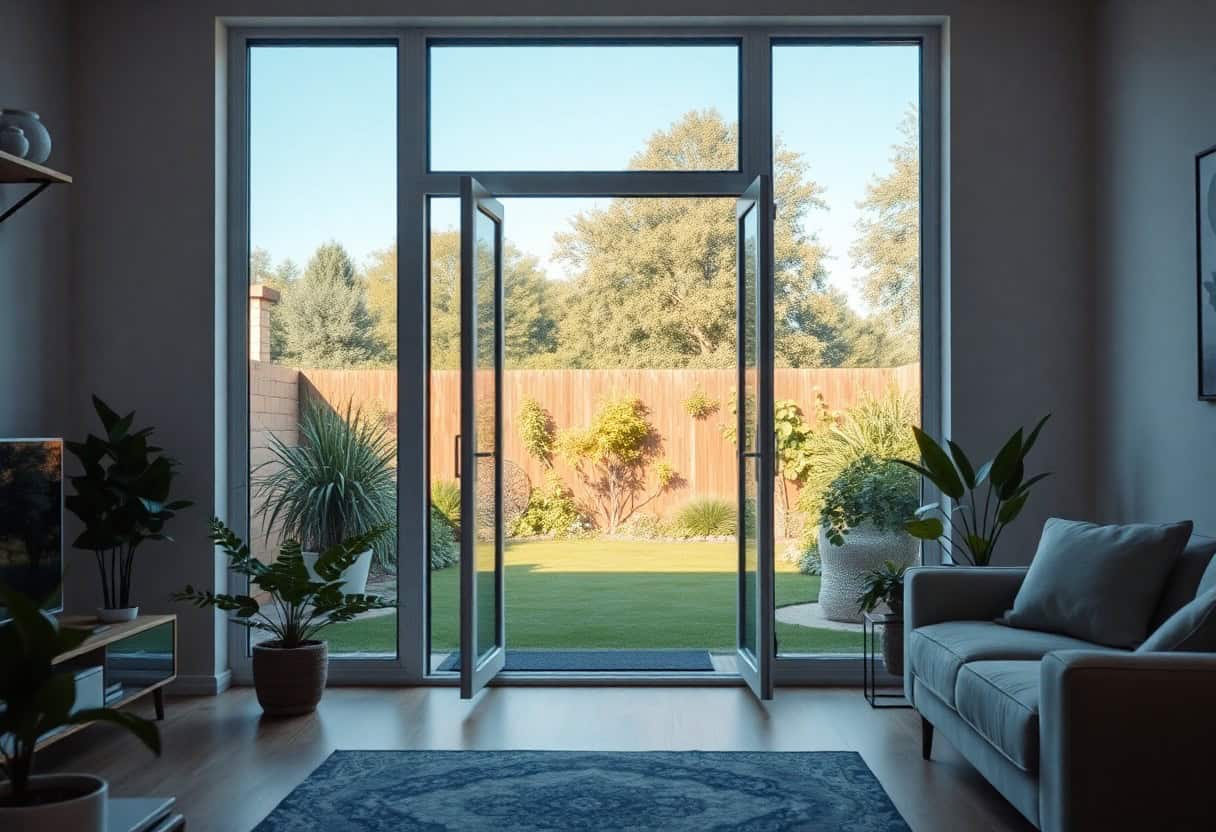
Ventilation and Airflow Considerations
For optimal indoor air quality, proper ventilation is important. Without sufficient airflow, moisture can build up, leading to issues such as mould growth and damage to your property. uPVC French doors can facilitate this airflow, allowing fresh air into your home while maintaining energy efficiency. Their innovative design helps reduce the risk of condensation, ensuring a healthier indoor environment for you and your family.
Importance of Proper Ventilation
After understanding the significance of ventilation, you can appreciate how it influences your indoor climate. It helps remove stale air, excess moisture, and harmful pollutants, creating a more comfortable living space. Good ventilation mitigates the risks associated with poor air quality, enabling you to breathe easier and enjoy a healthier home atmosphere.
Enhancing Airflow with uPVC French Doors
By choosing uPVC French doors, you can significantly enhance airflow within your home. The wide opening and stylish design allow for an ample exchange of air, helping to circulate fresh outdoor air while expelling stale, humid air.
Ventilation is not just about opening windows; it’s about creating a constant flow of air throughout your home. With uPVC French doors, you can easily achieve this goal, as their large double doors provide a generous entry point for air. You’ll find that during warmer months, the doors can be fully opened, promoting cross-ventilation that can effectively combat moisture build-up. This leads to a reduction in the likelihood of mould growth and indoor allergens, thereby improving your home’s air quality for you and your loved ones.
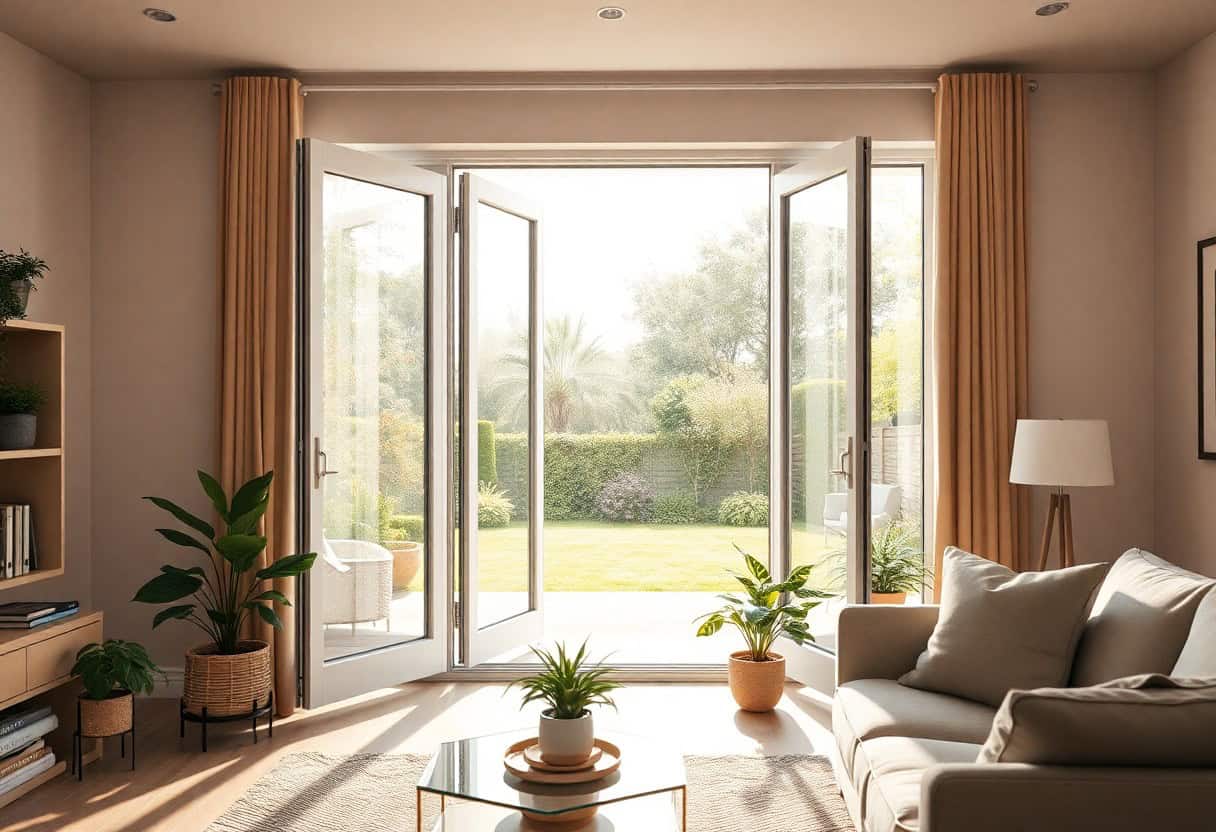
Maintenance Tips for Optimal Performance
Now, to ensure your uPVC French doors perform at their best, regular maintenance is crucial. Follow these tips:
- Keep frames and handles clean.
- Inspect seals for signs of wear.
- Lubricate moving parts periodically.
- Check drainage holes are clear.
Knowing these maintenance practices will prolong the life of your doors and enhance their efficiency in controlling moisture.
Regular Cleaning and Inspection
Beside routine maintenance, performing regular cleaning and inspection of your uPVC French doors is key. Wipe down the frames and glass using a mild detergent and warm water to eliminate dirt and grime. Make it a habit to inspect for any cracks, discolouration, or potential rot which could affect their performance.
Upkeep of Seals and Frames
Frames should be regularly checked for any signs of damage or wear. Seals play a significant role in keeping moisture out, so inspecting them routinely is crucial. Ensuring that seals are intact and functioning properly will maximise the energy efficiency of your doors and maintain a healthy indoor environment.
Indeed, proper upkeep of your seals and frames not only prevents moisture ingress but also increases the longevity of your uPVC French doors. Be vigilant about any signs of deterioration; damaged seals can lead to air leaks and water ingress, causing substantial damage over time. Regularly applying a silicone-based lubricant to hinges and ensuring the frames are free from debris will contribute greatly to optimal performance and a healthier home.
Benefits of a Healthy Indoor Environment
Despite the modern conveniences in our homes, many people overlook the importance of a healthy indoor environment. Maintaining good air quality not only enhances your comfort but also contributes to your overall well-being. By controlling condensation and moisture, uPVC French doors can significantly improve the air you breathe, creating a more enjoyable and invigorating living space.
Effects on Health and Well-Being
One of the most significant effects of poor indoor air quality is on your health. Constant exposure to dampness and mould can lead to respiratory issues, allergies, and other health problems. By ensuring proper moisture control with uPVC French doors, you create a safer environment that promotes better health for you and your family.
Long-Term Financial Savings
Between initial installation costs and ongoing maintenance, you may be concerned about your investment in home improvements. However, uPVC French doors offer significant long-term financial savings through energy efficiency and reduced repair costs.
In addition to enhancing your home’s aesthetic appeal, uPVC French doors provide energy efficiency that can lead to noticeable reductions in heating and cooling bills. Proper insulation minimises heat loss, effectively lowering your energy costs over time. Furthermore, by preventing moisture and mould damage, you avoid the potentially expensive repairs associated with water damage, ensuring that your home remains a valuable asset. Making this investment now can lead to substantial financial benefits in the long run.
To wrap up
With this in mind, it is clear that uPVC French doors play a significant role in controlling condensation and moisture, ultimately contributing to a healthier indoor environment. By effectively insulating your home and reducing the risk of dampness and mould, you can enhance both your comfort and your wellbeing. Investing in these doors not only improves your living space but also promotes a safer atmosphere for you and your family, ensuring that your home remains a pleasant and inviting place to be.
FAQ
Q: How do uPVC French doors help in controlling condensation?
A: uPVC French doors are designed with thermal efficiency in mind. The multi-chambered profile of uPVC material minimises heat transfer, keeping the interior warm while reducing the likelihood of condensation forming on the surfaces. This thermal break helps maintain a consistent temperature within the home, thereby lowering the chances of moisture build-up.
Q: What is the significance of controlling moisture indoors?
A: Controlling moisture indoors is vital for maintaining a healthy living environment. Excess moisture can lead to issues such as mould growth, which can affect air quality and lead to potential health problems. Moreover, it can damage furniture and structural elements of your home. By minimising moisture levels, uPVC French doors contribute to a healthier indoor atmosphere.
Q: Are uPVC French doors energy efficient, and how does this relate to moisture control?
A: Yes, uPVC French doors are energy efficient. They offer excellent insulation properties, which helps to keep indoor temperatures stable. By reducing drafts and maintaining warmth, these doors help prevent cold spots where condensation typically occurs. This energy efficiency not only aids in moisture control but also helps in reducing energy bills.
Q: Can uPVC French doors contribute to better ventilation in a home?
A: While uPVC French doors are primarily designed for aesthetics and insulation, they can enhance ventilation when opened. Proper ventilation is necessary for reducing indoor humidity levels. Homeowners can achieve a balance by occasionally opening the doors to allow fresh air circulation, thus complementing the moisture management benefits that uPVC provides.
Q: How do I maintain my uPVC French doors to ensure they continue to control condensation effectively?
A: Regular maintenance of uPVC French doors involves cleaning the frames and glass with appropriate solutions to remove dirt and grime that may trap moisture. Lubricating the hinges and locking mechanisms is also important for smooth operation. Additionally, checking seals for any signs of wear and tear will ensure a tight fit, preventing drafts and further aiding in moisture control.

